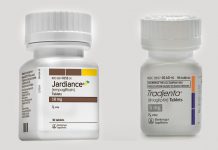COVID-19, the infection caused by the novel coronavirus, can cause some serious health problems, like lung damage, heart issues, and kidney damage.
Now, a new report has suggested the deadly virus could also cause the sudden onset of insulin-dependent diabetes mellitus (IDDM), or type 1 diabetes.
The report, published in Nature Metabolism, detailed the case of a 19-year-old German man with asymptomatic COVID-19 who ended up in a hospital with a new case of IDDM.
A few weeks before he developed diabetes, the young man’s parents developed COVID-19 symptoms after an Austrian ski trip. Later, the entire family tested positive for the virus. Both his parents tested positive for COVID-19 antibodies, as did he, indicating that all were infected with COVID-19. However, he did not have any symptoms of the infection.
Five to six weeks later, he was admitted to the hospital, as he was exhausted and had lost over 26 pounds. He also had complaints of frequent urination and left-sided flank pain. His random blood glucose level was over 550 mg/dL, a normal level is less than 140 mg/dL.
Doctors suspected the young man had type 1 diabetes. They found that he has a genetic variant that is rarely associated with type 1 diabetes and not the genetic variants commonly associated with type 1. He also did not have antibodies that type 1 diabetics usually have at diagnosis, leaving researchers baffled.
Study author Dr. Matthias Laudes of University Medical Centre Schleswig-Holstein in Kiel, Germany, said they have a plausible explanation for how coronavirus infections could lead to a new and sudden diabetes diagnosis.
The authors believe that COVID-19 affects the ACE-2 receptors that might damage the beta cells of the pancreas that secrete insulin to regulate blood sugar levels. An overreaction of the immune system due to the virus could damage the healthy cells, including the beta cells, possibly causing IDDM.
Endocrinologist Dr. Caroline Messer of Lenox Hill Hospital in NYC said she had heard there has been a surge in autoimmune diabetes since the coronavirus pandemic started, supporting the current report.
“This could account for the uptick in antibody-negative type 1 diabetes,” Dr. Messer said. “It is important for practitioners to be aware of the possibility of insulin-dependent diabetes approximately four weeks after infection in spite of negative [type 1 diabetes] antibodies.”
Dr. Sanjoy Dutta, associate vice president of research and institutional partnerships at JDRF (Juvenile Diabetes Research Foundation), said, “I don’t think this is type 1 or type 2 diabetes. I think it should be called new-onset or sudden onset insulin-dependent diabetes.”
He noted, “We need to know the mechanism behind these cases, and until we get more evidence, we should stay open-minded. We don’t know if it’s beta-cell destruction. It’s too soon for this to be boxed in as type 1 diabetes.”
However, a new study from the University of Florida (UF) may oppose the German authors’ theory.
The Florida study looked at the pancreases of 36 deceased people without COVID-19 and did not find ACE2 in their beta cells.
Senior author Mark Atkinson of UF said, “Their finding does not provide support to the notion that you’re going to develop diabetes because the coronavirus goes in and destroys an individual’s insulin-producing cells.”
Dr. Dutta said people and medical providers should be alert for any symptoms of diabetes after recovering from a COVID-19 infection, irrespective of the mechanism. The symptoms of diabetes include extreme fatigue, increased thirst, increased urination, increased appetite, dry mouth, and unexplained weight loss.





















